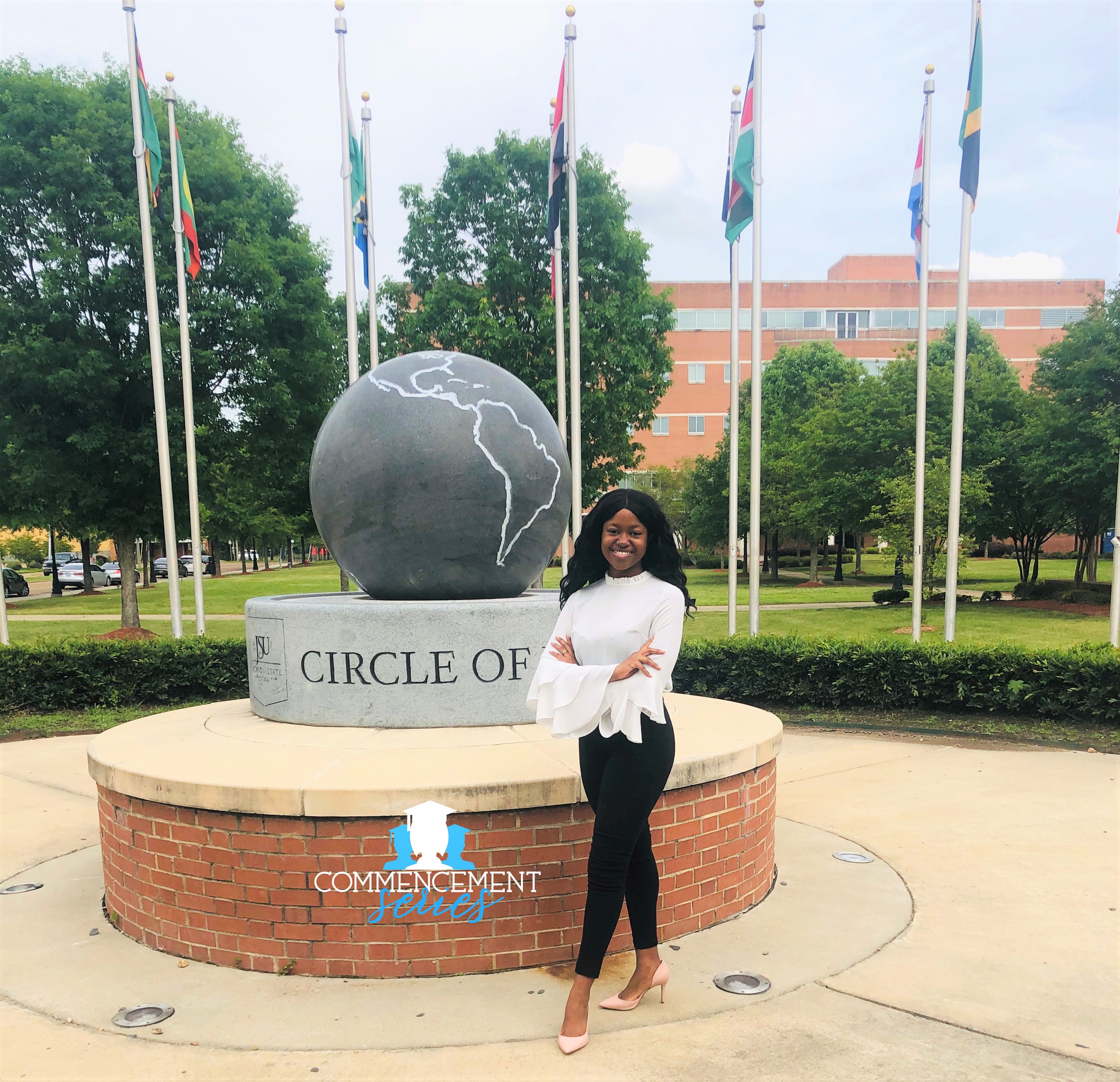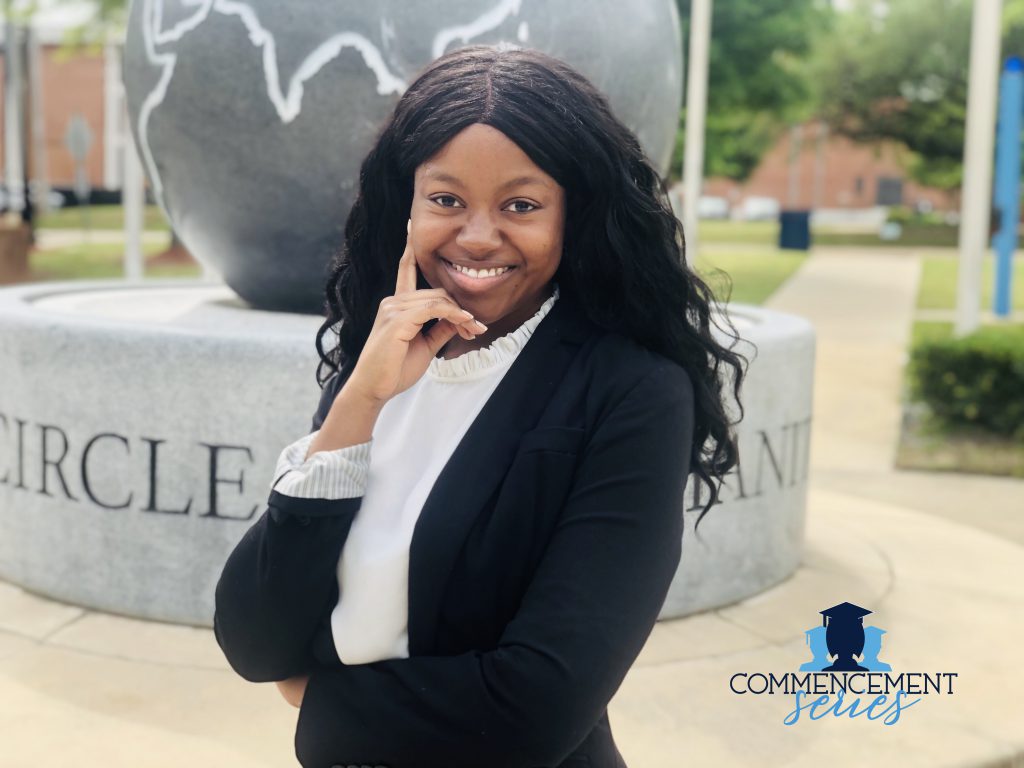
![]() [hr][hr]
[hr][hr]
Jasmine King is in the uplifting business. More specifically, the aspiring attorney intends to uplift minority communities by focusing on civil rights, criminal justice reform and social equity.
A first-generation graduate, who completed her political science degree this past spring, King accepted a full-ride offer to Syracuse University as a Public Affairs and International Affairs Exceptional Scholar. She will pursue her master’s degree in the fall before heading to law school.
“In the end, I think what got me was the faculty. Both schools have wonderful faculty,” said King of pondering a scholarship offer from Rutgers University before choosing Syracuse. “But once I received my acceptance from Syracuse, the faculty members called me and told me they were really excited to have me.”
King also shared that the school’s admissions counselor was informative and continually reached out to share important dates, events and changes regarding COVID-19.
“They’re ultimately waiting to learn when it’s safe to have students on campus. Until then, we’ll be working online,” she said. “But another amazing thing about Syracuse is that I can finish my program in one year and then go on to law school.”
The Vicksburg native has held a long-time interest in issues impacting people of color. While a member of the criminal justice reform team for the Southern Poverty Law Center, King reviewed letters from adult and youth offenders seeking assistance. As a sophomore, King presented at several political science conferences her research on the psychophysiological response that black people have to police.
 During her junior year, she expressed a desire to start a nonprofit for minority youth, saying: “I feel a large part of reform needs to focus on preparing children. If they had resources, opportunities, advocates and mentors available, there would not be this matriculation from youth offender to adult offender.”
During her junior year, she expressed a desire to start a nonprofit for minority youth, saying: “I feel a large part of reform needs to focus on preparing children. If they had resources, opportunities, advocates and mentors available, there would not be this matriculation from youth offender to adult offender.”
Last year, King was also one of 30 students from around the nation selected for the University of California Berkley Public Policy and International Affairs Junior Summer Institute. This year she finished the semester with a 3.8 GPA, graduating summa cum laude.
Now, King says, the COVID-19 pandemic has reaffirmed a need for more African-American representation among policymakers. “We are definitely seeing how this disproportionately impacts black people. It’s not just eye-opening for me but for other people in our society.”
For centuries, black people have inherently faced socioeconomic disparities more than any other group, she explained. For example, King contends that a large number of black people work jobs that are considered essential during the public health epidemic, which places their well-being at risk.
“We have always been (employed) in positions or careers where we cannot work from home. We are in the field, on the ground, always in the labor movement. They are jobs that also involve interacting with people like grocery store, construction or transportation workers,” she said.
Beginning the next phase of her higher-education journey during a public-health pandemic, King calls it an “interesting time” because it has made her more aware of the difference she can make in the lives of others.
“I feel like now more than ever we are in need of individuals who are innovative and passionate when it comes down to the brown community,” said King, who was also selected to be a competitiveness scholar for the White House Initiative on Historically Black Colleges and Universities in 2019.
The passion King shows toward her community is similar to the passion she holds for her alma mater.
“I’m going to miss the culture at Jackson State. It’s a very loving culture that makes sure students thrive. I plan on staying in touch with a lot of my professors because, if I did not have them, I would not have made it,” she said, followed by a laugh.
King reserved special thanks to the Department of Political Science, including Dr. Leniece Titani-Smith, interim chair; Dr. Byron D. Orey, professor of political science; and Tamara Preston, administrative assistant.
”Whenever I had an issue, I could go to any one of these people, and they would talk me through all of my options and made sure I was making the best decision for myself academically, professionally or personally.”
Dr. Smith described King as a woman on fire, who has demonstrated true intellectual curiosity, alongside a desire to effect positive change in the community.
Looking to mirror the change she wants to see, King said she is excited for what is in store. “I’ll not only be able to hone my public sector skills but better understand how it correlates to policy and marginalized black and Latino communities. And it’s just time for us to have more innovative thinkers in the realm of public policy. If not, we’ll keep encountering issues like COVID-19.”






